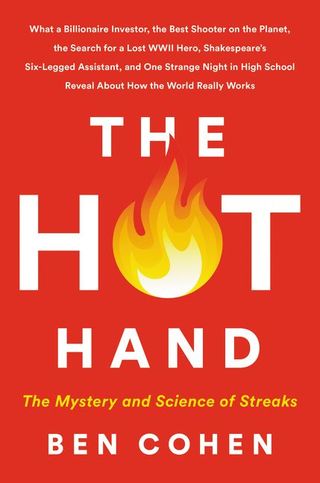Confidence
The Hot Hand: Does Success Lead to More Success?
Sports reporter Ben Cohen explores the science of the “hot hand” in a new book.
Posted March 25, 2020
Ben Cohen still vividly recalls his teenage brush with “the hot hand”: the phenomenon where a successful outcome (in sports, business, or another domain) seems to increase the odds that the next attempt is successful.

During a JV basketball game, Cohen—a self-described “absolutely terrible” player—embarked on an unstoppable (and for him, completely unprecedented) shooting streak. His newfound talent felt exhilarating and otherworldly, he recalls, and he scored more points in a quarter than he ever had before.
His basketball career fizzled out soon after. But that game never left his mind. Cohen, now a sports reporter for the Wall Street Journal, spent years wondering if he had truly been touched by the hot hand—and whether such a thing even existed—or if he had simply read too much into a series of lucky shots.
It turns out that he wasn’t the only person asking that question. In his new book, The Hot Hand, published this month, Cohen details the decades-long scientific quest to prove or disprove the existence of the hot hand effect. He spoke with PT about what makes it such a mesmerizing phenomenon for researchers, athletes, and anyone else who’s ever felt “in the zone.” The following are edited excerpts of the interview.
Your experience inspired you to dig deeper into the science of the hot hand phenomenon. Were you surprised by what you found?
Absolutely. When I felt the hot hand, I was in high school—I had no idea people were studying what I had just experienced. It wasn’t until I started working for the Journal that I stumbled onto a 1985 paper concluding that there was no such thing as the hot hand and that people were just seeing patterns where there were none. It caused a huge ruckus at the time and kicked off a fierce debate that would last for several decades.
Why did that paper cause such a stir?
There aren’t many people who don’t instinctively believe in the hot hand—in part because most of us have either felt it ourselves or seen it. In that paper, they took a poll; over 90 percent of respondents said that they intuitively believed in the hot hand. The finding was, therefore, so counterintuitive that no one believed it at first. It was like being told that grass is actually blue.
Has the debate since been settled, or is it still raging?
It’s still going strong. In recent years, new evidence has emerged concluding that there might actually be such a thing as the hot hand—and in fact, there probably is.
In addition to new studies being published, researchers have discovered that some of the earlier studies may have been skewed or flawed—often in ways that no one could have anticipated at the time. Our understanding of the hot hand wasn’t good enough, and quite simply the data wasn’t good enough yet. The data we can capture now is much better; those psychologists in the ’80s could never have dreamed it in their wildest, wonkiest imaginations.
Whether the hot hand exists or not, are there any risks to believing that it does?
It’s a pervasive feature of human brains to see patterns where they don’t exist. But brilliant cognitive scientists have repeatedly shown that our intuition often leads us astray. That's what these psychologists and economists who first studied the hot hand were trying to warn against: We should not always trust our own minds.
Researchers now have reason to believe that the hot hand exists—in certain instances. But it’s important to figure out if you’re in a situation where believing in it could be disastrous. If a farmer believes in the hot hand and makes overconfident decisions that backfire, for instance, he could lose everything.
What about benefits?
In the NBA, players have a collective belief in the hot hand. There are real benefits to that—increased confidence, for instance—because not only do they all believe in the hot hand, but they all behave according to the hot hand. They believe that success begets more success, so a shooter who thinks he’s on a streak starts taking harder shots because he’s feeling more confident. The defense adjusts; the offense adjusts. And if he misses one shot, it’s not the end of the world.
The NBA, though, comprises the best players in the world. And a major example in your book of a player who gets “hot” is Steph Curry—and he’s indisputably amazing at basketball. How can you separate being “hot” from just being really good at something?
When we think about the hot hand, it’s important to think about it in terms of comparing oneself to oneself. When I think of my own brush with the hot hand, I’m not comparing myself to Steph Curry; he’s a better basketball player than I am, obviously. When we talk about times when Steph has had the hot hand, we’re talking about when he’s the hottest he’s been—when he’s the best version of himself.
In a study that was published last year, researchers looked at “hot streaks” for movie directors, scientists, and artists. They were comparing Einstein to Einstein. And what they found was that our best works tend to come in bunches. When you look at the works of one person and compare it to the works of that very same person, the chances are, their best works happen right around each other.
The temperature of everyone’s hot hand is a little bit different. Steph Curry’s is obviously a lot hotter than my lukewarm hand 20 years ago. But when judging your own streaks, it’s important to think about what your own best work is.

That seems like part of the magic of the hot hand—even if what you’re doing is objectively average, you can tell it’s better than anything you’ve done before.
You’re beating your own expectations, even if your expectations are different from everybody else’s. It’s your version of being superhuman, in a way.
Is that emotional pull part of why your own experience stuck with you for so long?
We all have felt or been touched by the hot hand at some point in our lives, whether it’s in life, at work, or on some basketball court with nobody watching. There’s a reason that we remember it: It makes us happy. Those moments stick with us because, for some, it literally changes our lives. For others, it’s just such a superhuman, pleasurable sensation that it’s almost impossible to forget.




